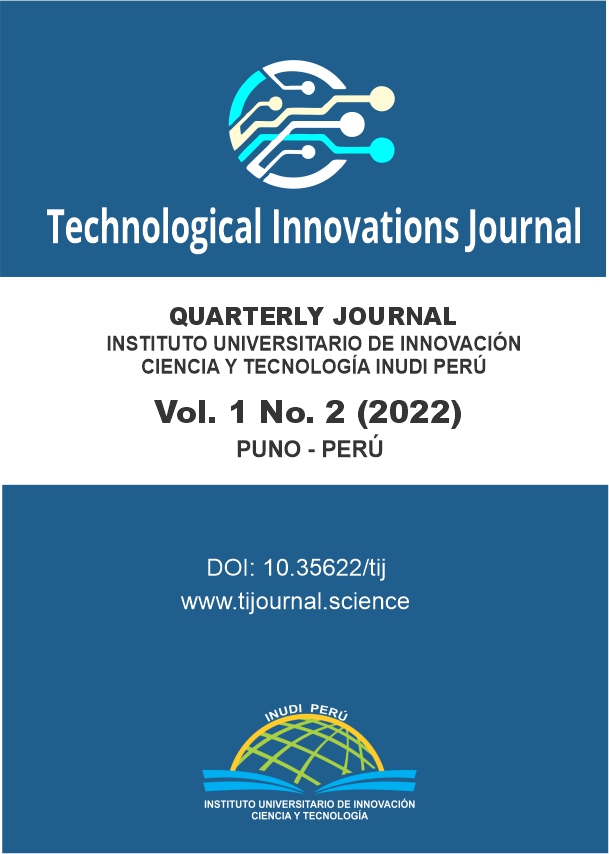Aprendizaje desde la virtualidad en el modelo de aula invertida: una experiencia en la educación universitaria
DOI:
https://doi.org/10.35622/j.ti.2022.02.003Palabras clave:
ambientes virtuales de aprendizaje, aula invertida, TIC, virtualidadResumen
El objetivo fue analizar el aprendizaje desde la virtualidad en el modelo de aula invertida que se usó en la Maestría de Administración de Micro, Pequeñas y Medianas Empresas de la Universidad Autónoma de Sinaloa para identificar los ambientes virtuales de aprendizaje más idóneos. Con enfoque cualitativo, de tipo exploratorio y descriptivo, se desarrolló análisis documental, bajo el método etnográfico y de investigación-acción, se aplicó la observación participante, encuesta por conveniencia con cuestionario a prueba de Alpha de Cronbach y entrevistas a una muestra de 18 estudiantes de posgrado con un nivel de confianza del 95%. Los resultados registran que en Sinaloa no se tiene capilaridad digital y no todos los estudiantes de la Maestría tienen conectividad para desarrollar el modelo de aula invertida. Tras la pandemia, los estudiantes consideran que es un modelo que potencia el desarrollo de sus aprendizajes y fortalece las competencias de autogestión, autorregulación y autoeficacia en los diferentes ambientes virtuales de aprendizaje. La madurez digital de los estudiantes, ofrece argumentos para definir la transformación virtual en los programas de posgrado de la Universidad. Se desecha la hipótesis de que los estudiantes de postgrado rechazan el modelo como producto del escepticismo e intolerancia; sino más bien, debido a la carencia de equipos tecnológicos especializados y la falta de conectividad.
Referencias
Akçayir Gökçe and Akçayir Murat (2018). The flipped classroom: A review of its advantages and challenges, Computers & Education, 126 (11), p.p. 334-345, https://doi.org/10.1016/j.compedu.2018.07.021. DOI: https://doi.org/10.1016/j.compedu.2018.07.021
Aldana Olarte, R. A.; Bula Calderón, A. F.; Arias López, L.A. y Aldana Baron, D. M. (2018). Academic impact of a flipped-classroom strategy in anatomy, Revista Cubana de Educacion Medica Superior, 32 (3), 61-67. https://www.medigraphic.com/pdfs/educacion/cem-2018/cem183e.pdf.
Almendros, P.; Montoya, M. y Pablo-Lerchundi, I. (2021). Aula invertida y trabajo colaborativo en Química, Educación química, 32 (4), p.p.142-153, https://doi.org/10.22201/fq.18708404e.2021.5.78412. DOI: https://doi.org/10.22201/fq.18708404e.2021.5.78412
Al-Samarraie, H., Shamsuddin, A. and Alzahrani, A.I. (2020). A flipped classroom model in higher education: a review of the evidence across disciplines, Educational Technology Research and Development, 68 (3), 1017-1051. DOI: 10.1007/s11423-019-09718-8. DOI: https://doi.org/10.1007/s11423-019-09718-8
Andone, D. and Vasiu, R. (2016). MOOCs in higher education—flipped classroom or a new smart learning model? In: Li Y. et al. (eds) State-of-the-Art and Future Directions of Smart Learning. Lecture Notes in Educational Technology. Springer, Singapore. DOI: 10.1007/978-981-287-868-7_37. DOI: https://doi.org/10.1007/978-981-287-868-7_37
Artal-Sevil, J.S., Gargallo-Castel, A.F. and Valero-Gracia, M.S.V. (2020). Flipped teaching and interactive tools. A multidisciplinary innovation experience in higher education, International Conference on Higher Education Advances, 2020-June, 103-112. DOI: 10.4995/HEAd20.2020.10990. DOI: https://doi.org/10.4995/HEAd20.2020.10990
Bingen, H.M., Steindal, S.A., Krumsvik, R.J., Tveit, B. (2020). Studying physiology within a flipped classroom: The importance of on-campus activities for nursing students’ experiences of mastery, Journal of Clinical Nursing, 29 (15-16), 2907-2917. DOI: 10.1111/jocn.15308. DOI: https://doi.org/10.1111/jocn.15308
Canizales, W., Ries, F. and Rodríguez, C. (2020). Learning style and class environment: Situations preceding pedagogical innovation in sports science students, Retos, 38, 213-221. https://recyt.fecyt.es/index.php/retos/article/view/72791/48150. DOI: https://doi.org/10.47197/retos.v38i38.72791
Cardoso Espinosa, E.O. (2022). El aula invertida en la mejora de la calidad del aprendizaje en un posgrado en Administración, Revista Electrónica de Investigación Educativa, 24 (04), p.p. 1-15, https://doi.org/10.24320/redie.2022.24.e04.3855. DOI: https://doi.org/10.24320/redie.2022.24.e04.3855
Cretu, I., Grigore, M. and Scripcariu, I.-S. (2020). Get ready for gen Z, our next generation of medical students, Revista de Cercetare si Interventie Sociala, 69, 283-292. DOI: 10.33788/rcis.69.18. DOI: https://doi.org/10.33788/rcis.69.18
Coto Villalobos; A.E. (2021). El aula invertida en la clase de matemática, Ciencia Latina Revista Científica Multidisciplinar, 5 (5), p.p. 750-766, https://doi.org/10.37811/cl_rcm.v5i5.873. DOI: https://doi.org/10.37811/cl_rcm.v5i5.873
Dean, M.D. (2020). Using the learning assistant model in an undergraduate business analytics course, INFORMS Transactions on Education, 20 (3), 125-133. DOI: 10.1287/ITED.2019.0221. DOI: https://doi.org/10.1287/ited.2019.0221
Díaz-Bazo, C.; Suárez-Díaz, G. y Flores-Flores, E. (2016). Guía de investigación en Educación, Perú, Editado por Pontificia Universidad Católica del Perú, Vicerrectorado de Investigación y Dirección de Gestión de la Investigación.
Di Marco, L., Breton, J., Martin, D.K., Morand, P. and Gillois, P. (2020). Freedom of Master's Degree Students to Study in Health Curricula: Switching to Optimized Blended Learning as a Solution!, Yearbook of medical informatics, 29 (1), 247-252. DOI: 10.1055/s-0040-1701978. DOI: https://doi.org/10.1055/s-0040-1701978
Foster, G. and Stagl, S. (2018). Design, implementation, and evaluation of an inverted (flipped) classroom model economics for sustainable education course, Journal of Cleaner Production, 183, 1323-1336. DOI: 10.1016/j.jclepro.2018.02.177. DOI: https://doi.org/10.1016/j.jclepro.2018.02.177
Galvis, Á.H., López-González, Y.Y. and Aarón-Gonzálvez, M.A. (2018). Aprendiendo de una transformación de prácticas pedagógicas en cursos de maestría en la modalidad híbrida de aprendizaje, Revista de Educacion a Distancia, (58) 2, 1-35. DOI: 10.6018/red/58/2. DOI: https://doi.org/10.6018/red/58/2
Goedhart, N.S., Blignaut-van Westrhenen, N., Moser, C., and Zweekhorst, M.B.M. (2019). The flipped classroom: supporting a diverse group of students in their learning, Learning Environments Research, 22 (2), 297-310. DOI: 10.1007/s10984-019-09281-2. DOI: https://doi.org/10.1007/s10984-019-09281-2
González-Velasco, C., Feito-Ruiz, I., González-Fernández, M., Álvarez-Arenal, J.-L. and Sarmiento-Alonso, N. (2021). Does the teaching-learning model based on the flipped classroom improve academic results of students at different educational levels?, Revista Complutense de Educacion, 32 (1), 27-39. DOI: 10.5209/RCED.67851. DOI: https://doi.org/10.5209/rced.67851
Gren, L. (2020). A Flipped Classroom Approach to Teaching Empirical Software Engineering, IEEE Transactions on Education, 63 (3), art. no. 8960400, 155-163. DOI: 10.1109/TE.2019.2960264. DOI: https://doi.org/10.1109/TE.2019.2960264
Gutiérrez-Tapias, M. (2018). Estilos de aprendizaje, estrategias para enseñar. Su relación con el desarrollo emocional y "aprender a aprender". Tendencias Pedagógicas, (31), 83-96. http://dx.doi.org/10.15366/tp2018.31.004. DOI: https://doi.org/10.15366/tp2018.31.004
Huening, F. (2020). Complexity for heterogeneous classes: Teaching embedded systems using an open project approach, SEFI 47th Annual Conference: Varietas Delectat. Complexity is the New Normality, Proceedings, 540-549. https://www.sefi.be/wp-content/uploads/2019/10/SEFI2019_Proceedings.pdf.
Jehma, H. (2020). Second life: A three-dimenional virtual world for developing. Thai efl learners’ english communication skills, Turkish Online Journal of Distance Education-TOJDE, Special Issue (4), 49-60. DOI: 10.17718/tojde.770909. DOI: https://doi.org/10.17718/tojde.770909
Jehma, H. (2016). Flipped learning as an english communicative skill development tool for efl learners in Thailand, Man in India, 96 (1-2), 609-616.
Jiang, Y.-C. and Jong, S.-Y. (2020). Learner Preparedness in Flipped Classroom: A Case Study of a Flipped Postgraduate Course, Proceedings-2020 International Symposium on Educational Technology, ISET 2020, art. no. 9215504, 57-61. DOI: 10.1109/ISET49818.2020.00022. DOI: https://doi.org/10.1109/ISET49818.2020.00022
Khoynaroud, A.A., Akbarzadeh, A., Ghojazadeh, M. and Ghaffarifar, S. (2020). Assessment of the effect of application of an educational wiki in flipped classroom on students' achievement and satisfaction, BMC Medical Education, 20 (1), art. no. 293, DOI: 10.1186/s12909-020-02223-0. DOI: https://doi.org/10.1186/s12909-020-02223-0
Ling, F.Y.Y. and Gan, M.J.S. (2020). Mastery of Fundamental Concepts Based on Students' Learning Approach in Flipped Classrooms, Journal of Civil Engineering Education, 146 (2), art. no. 04019006, DOI: 10.1061/(ASCE)EI.2643-9115.0000011. DOI: https://doi.org/10.1061/(ASCE)EI.2643-9115.0000011
Lyons, K.M., Brock, T.P., Malone, D.T., Freihat, L. and White, P.J. (2020). Predictors of pharmacy student performance on written and clinical examinations in a flipped classroom curriculum, American Journal of Pharmaceutical Education, 84 (12), art. no. 8038, 1627-1636. DOI: 10.5688/ajpe8038. DOI: https://doi.org/10.5688/ajpe8038
Lyz, N., Lyz, A., Neshchadim, I. and Kompaniets, V. (2020). Blended Learning and Self-Reflection as Tools for Developing IT-Students' Soft Skills, 2020 5th International Conference on Information Technologies in Engineering Education, Inforino 2020 - Proceedings, art. no. 9111723. DOI: 10.1109/Inforino48376.2020.9111723. DOI: https://doi.org/10.1109/Inforino48376.2020.9111723
Ohn-Sabatello, T. (2020). Incorporating Technology Tools and the 5E Instructional Model to Teach High School Students Chemistry by Online Instruction, Journal of Chemical Education, 97 (11), 4202-4208. DOI: 10.1021/acs.jchemed.0c00824. DOI: https://doi.org/10.1021/acs.jchemed.0c00824
Onieva López, J.L. and Cremades (2021). Analysis of the prospective use of flipped classroom by future teachers of Spanish Language and Literature in Secondary Education, Tejuelo, 33, 319-344. DOI: 10.17398/1988-8430.33.319. DOI: https://doi.org/10.17398/1988-8430.33.319
Rodríguez-Chueca, J., Molina-García, A., García-Aranda, C., Pérez, J., and Rodríguez, E. (2020). Understanding sustainability and the circular economy through flipped classroom and challenge-based learning: an innovative experience in engineering education in Spain, Environmental Education Research, 26 (2), 238-252. DOI: 10.1080/13504622.2019.1705965. DOI: https://doi.org/10.1080/13504622.2019.1705965
Rodríguez-Jiménez, F.J., Pérez-Ochoa, M.E., & Ulloa-Guerra, O. (2021). Aula invertida y su impacto en el rendimiento académico: una revisión sistematizada del período 2015-2020. EDMETIC, Revista de Educación Mediática y TIC, 10(2), p.p.1-25. https://doi.org/10.21071/edmetic.v10i2.13240. DOI: https://doi.org/10.21071/edmetic.v10i2.13240
Ros, G. y Rodríguez Laguna, M.T. (2021). Influencia del aula invertida en la formación científica inicial de Maestros/as: beneficios en el proceso de enseñanza-aprendizaje, actitudes y expectativas hacia las ciencias. Revista de Investigación Educativa, 39(2), pp-pp.463-482.DOI: http://dx.doi.org/10.6018/rie.434131. DOI: https://doi.org/10.6018/rie.434131
Rui, Z., Lian-Rui, X., Rong-Zheng, Y., Jing, Z., Xue-Hong, W. and Chuan, Z. (2017) Friend or Foe? Flipped Classroom for Undergraduate Electrocardiogram Learning: A Randomized Controlled Study, BMC Medical Education, 17 (1), art. no. 53, DOI: 10.1186/s12909-017-0881-8. DOI: https://doi.org/10.1186/s12909-017-0881-8
Ruiz-Jiménez, M. C.; Martínez-Jiménez R.; Licerán-Gutiérrez, A. and García-Martía E. (2022). Students’ attitude: Key to understanding the improvement of their academic RESULTS in a flipped classroom environment, The International Journal of Management Education, 20 (2), p.p. 1-11, https://doi.org/10.1016/j.ijme.2022.100635. DOI: https://doi.org/10.1016/j.ijme.2022.100635
Salamanca, J. (2022). Influencia de los objetos de aprendizaje en la implementación del aula invertida, Rev. Innova Educación, 4 (3), p.p. 137-151, DOI: https://doi.org/10.35622/j.rie.2022.03.009. DOI: https://doi.org/10.35622/j.rie.2022.03.009.es
Sánchez-Santander, A. M. y Cárdenas-Cordero, N. M. (2021). Aula invertida en pandemia: Análisis de una experiencia disruptiva desde la mirada de los representantes, Episteme Koinonia, 4 (8), p.p. 292-307, DOI: https://doi.org/10.35381/e.k.v4i8.1357. DOI: https://doi.org/10.35381/e.k.v4i8.1357
Santillán-Aguirre, J. P. (2022). Flipped Classroom: ¿Enfoque o Metodología?, Polo del Conocimiento, 7 (2), p.p. 2039-2059, DOI: 10.23857/pc. v7i2.3695. DOI: https://doi.org/10.23857/pc
Schneider, A., Kühl, M., Kühl, S.J. (2019). Longitudinal curriculum development: Gradual optimization of a biochemistry seminar, GMS Journal for Medical Education, 36 (6), art. no. Doc73, DOI: 10.3205/zma001281.
Shiau, S., Kahn, L.G., Platt, J., Li, C., Guzman, J.T., Kornhauser, Z.G., Keyes, K.M. and Martins, S.S. (2018). Evaluation of a flipped classroom approach to learning introductory epidemiology (2018) BMC Medical Education, 18 (1), art. no. 63, DOI: 10.1186/s12909-018-1150-1. DOI: https://doi.org/10.1186/s12909-018-1150-1
Sorokova, M.G. (2020a). Skepticism and learning difficulties in a digital environment at the Bachelor's and Master's levels: are preconceptions valid?, Heliyon, 6 (11), art. no. e05335, . DOI: 10.1016/j.heliyon. 2020.e05335. DOI: https://doi.org/10.1016/j.heliyon.2020.e05335
Sorokova, M.G. (2020b). Digital educational environment in university: Who is more comfortable studying in it? Psychological Science and Education, 25 (2), 44-58. DOI: 10.17759/pse.2020250204. DOI: https://doi.org/10.17759/pse.2020250204
Støckert, R., Bergsland, A., Fasciani, S. and Jensenius, A.R. (2020). Student active learning in a two-campus organization, eLearning and Software for Education Conference, 612-620. DOI: 10.12753/2066-026X-20-080. DOI: https://doi.org/10.12753/2066-026X-20-080
Stöhr, C., Demazière, C. and Adawi, T. (2020). The polarizing effect of the online flipped classroom, Computers and Education, 147, art. no. 103789, DOI: 10.1016/j.compedu.2019.103789. DOI: https://doi.org/10.1016/j.compedu.2019.103789
Suárez, V., Suarez-Quezada, M., Oros-Ruíz, S., y Ronquillo De Jesús, E. (2020). Epidemiología de COVID-19 en México: del 27 de febrero al 30 de abril de 2020, Revista Clínica Española, 20 (8), 463-471, DOI: 10.1016/j.rce.2020.05.007. DOI: https://doi.org/10.1016/j.rce.2020.05.007
Sun, Y. (2020). Practice of Informatization and Flipped Classroom in Technical Courses, Lecture Notes in Electrical Engineering, 675, 1065-1072. DOI: 10.1007/978-981-15-5959-4_131. DOI: https://doi.org/10.1007/978-981-15-5959-4_131
Tarasova, E. (2016). Professional English teaching on the basis of Blended Learning, Asian EFL Journal, 2, 79-85. https://cutt.ly/OXqHQql
Thi Thai, N.T.; De Wever, B. and Valcke M. (2017). The impact of a flipped classroom design on learning performance in higher education: Looking for the best “blend” of lectures and guiding questions with feedback, Computers & Education, 107 (April), p.p.113-126, https://doi.org/10.1016/j.compedu.2017.01.003. DOI: https://doi.org/10.1016/j.compedu.2017.01.003
Wang, X., Li, J. and Wang, C. (2020). The effectiveness of flipped classroom on learning outcomes of medical statistics in a Chinese medical school, Biochemistry and Molecular Biology Education, 48 (4), 344-349. DOI: 10.1002/bmb.21356. DOI: https://doi.org/10.1002/bmb.21356
Wong, E.Y. (2016). Students spark creativity teaching the systems engineering class, Proceedings of the 2016 Industrial and Systems Engineering Research Conference, ISERC 2016, pp. 175-181. https://www.researchgate.net/publication/317069284.
Descargas
Publicado
Número
Sección
Licencia
Derechos de autor 2022 Patricia Inzunza-Mejía, Mónica Rivera-Obregón, Ana López-Carmona (Autor/a)

Esta obra está bajo una licencia internacional Creative Commons Atribución 4.0.











